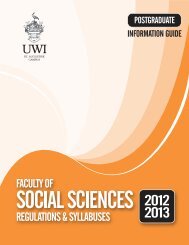Faculty of Humanities and Education (Postgraduate) - The University ...
Faculty of Humanities and Education (Postgraduate) - The University ...
Faculty of Humanities and Education (Postgraduate) - The University ...
You also want an ePaper? Increase the reach of your titles
YUMPU automatically turns print PDFs into web optimized ePapers that Google loves.
POSTGRADUATE REGULATIONS & SYLLABUSES 2012 - 2013<br />
THE FACULTY OF HUMANITIES & EDUCATION<br />
2. Three Pr<strong>of</strong>essional Knowledge courses, which will help<br />
students to construct pr<strong>of</strong>essional identities, <strong>and</strong> to<br />
develop curricular knowledge, pedagogical knowledge,<br />
<strong>and</strong> pedagogical content knowledge, as well as a capacity<br />
for critical thinking, problem solving, <strong>and</strong> decision<br />
making related to the content <strong>and</strong> implementation <strong>of</strong> the<br />
curriculum, <strong>and</strong> to their contexts <strong>of</strong> practice. <strong>The</strong>y orient<br />
students towards finding solutions to identified challenges<br />
encountered in schools <strong>and</strong> classrooms. Finally, the courses<br />
will promote values clarification by requiring students to<br />
respond to dilemmas <strong>of</strong> everyday practice. <strong>The</strong> courses<br />
are:<br />
• EDLA 5241: Designing Instruction for<br />
Adolescent Learners:<br />
<strong>The</strong> Teaching <strong>of</strong> English (6 credits)<br />
• EDSC 5271: Designing Instruction for<br />
Adolescent Learners: <strong>The</strong> Teaching <strong>of</strong><br />
Science (6 credits)<br />
• EDSS 5281: Designing Instruction for<br />
Adolescent Learners: <strong>The</strong> Teaching <strong>of</strong><br />
Social Sciences (6 credits)<br />
• <strong>Education</strong>al Assessment (3 credits)<br />
• Leading Pr<strong>of</strong>essional Enquiry (3 credits)<br />
3. Practice in <strong>Education</strong> (9 credits)<br />
This is a practicum which, by providing practical<br />
experiences in diverse classroom contexts, seeks to build<br />
students’ personal, practical knowledge; to present them<br />
with models <strong>of</strong> pr<strong>of</strong>essional behaviour; <strong>and</strong> thus to develop<br />
the knowledge, skills, <strong>and</strong> attributes needed to effectively<br />
manage classroom dynamics. <strong>The</strong> practicum has three<br />
phases:<br />
1. Supervised observation <strong>of</strong> practice<br />
2. Supervised practice, in collaboration with<br />
cooperating teachers<br />
3. Supervised, independent practice<br />
<strong>The</strong> programme has been designed to broaden <strong>and</strong> refine<br />
participants’world views by spiraling <strong>and</strong> integrating formal <strong>and</strong><br />
informal knowledge within the curriculum content. It merges<br />
elements that draw upon their personal experiences with formal<br />
concepts <strong>and</strong> theories from the disciplines, <strong>and</strong> further integrates<br />
significant opportunities for reflection <strong>and</strong> critical analysis.<br />
<strong>The</strong> programme is so sequenced that students will revisit <strong>and</strong><br />
refine their pr<strong>of</strong>essional skills <strong>and</strong> their underst<strong>and</strong>ing <strong>of</strong> core<br />
concepts as they are presented, with increasingly challenging<br />
pr<strong>of</strong>essional dilemmas at different stages <strong>of</strong> the programme<br />
<strong>and</strong> in different contexts.<br />
TOTAL: 30 CREDITS<br />
SEMESTER: I<br />
YEAR: I<br />
COURSE CODE: EDFA 5211<br />
COURSE TITLE: FUNDAMENTAL CONCEPTS FOR THE<br />
BEGINNING TEACHER<br />
NUMBER OF CREDITS: 3<br />
PREREQUISITES: NONE<br />
COURSE DESCRIPTION: This course introduces participants to<br />
fundamental concepts in education, which will help them to<br />
underst<strong>and</strong> <strong>and</strong> reflect on the functions, goals, <strong>and</strong> purposes<br />
<strong>of</strong> education; the influences that have shaped education <strong>and</strong><br />
schooling over time; <strong>and</strong> the world <strong>of</strong> the adolescent learner.<br />
Knowledge <strong>of</strong> these concepts will also help them to interrogate<br />
their own decisions to become teachers. <strong>The</strong> course places special<br />
emphasis on the varieties <strong>of</strong> contexts <strong>and</strong> problematic issues in<br />
education that teachers face, encouraging the participants to<br />
apply this theoretical knowledge in analysing their experiences<br />
<strong>of</strong> schools <strong>and</strong> the wider education environment.<br />
This theoretical knowledge is developed through an<br />
introduction to relevant concepts in the foundation disciplines<br />
<strong>of</strong> education—philosophy <strong>of</strong> education, psychology <strong>of</strong><br />
education, sociology <strong>of</strong> education, <strong>and</strong> language in education.<br />
Both disciplinary <strong>and</strong> interdisciplinary approaches are used in<br />
this course, applying concepts <strong>and</strong> theories from the foundation<br />
disciplines to topical or controversial issues in education. <strong>The</strong><br />
integration <strong>of</strong> the foundation disciplines in education is achieved<br />
through (a) an issues-based approach to the organisation <strong>of</strong> the<br />
course; (b) tutorials where discussion <strong>of</strong> issues is encouraged<br />
across disciplines; <strong>and</strong> (c) lectures in the separate disciplines.<br />
Assessment focuses on students’ability to synthesise theoretical<br />
<strong>and</strong> conceptual knowledge <strong>and</strong> apply such knowledge to the<br />
school context.<br />
Purpose <strong>of</strong> the Course/Rationale<br />
For pre-service teachers, an initial course delivering the<br />
foundational concepts in education is essential to an<br />
underst<strong>and</strong>ing <strong>of</strong> their work, especially a course that allows<br />
them to explore the nature <strong>of</strong> teaching <strong>and</strong> learning in the 21 st<br />
century. This course serves to anchor the entire programme for<br />
participants. <strong>The</strong>y are introduced to structured <strong>and</strong> disciplined<br />
ways <strong>of</strong> examining education <strong>and</strong> schooling (issues with which<br />
they have some familiarity). <strong>The</strong> course therefore seeks to<br />
supplant bias, habit, <strong>and</strong> personal experience as the primary<br />
means <strong>of</strong> underst<strong>and</strong>ing issues in education. <strong>The</strong> intent is to<br />
provide beginning teachers with a firm grasp <strong>of</strong> conceptual<br />
tools that they can use to describe <strong>and</strong> explain educational<br />
issues, especially as they confront these issues in a variety <strong>of</strong><br />
school settings <strong>and</strong> with a diverse clientele. Course delivery<br />
includes opportunities to confront the realities <strong>of</strong> the schools<br />
to which they are assigned with the theories <strong>and</strong> concepts <strong>of</strong><br />
the foundation disciplines in education. <strong>The</strong> general theoretical<br />
knowledge gained in this course is a necessary platform for<br />
the more specialised <strong>and</strong> in-depth foundation courses such<br />
as Addressing the Needs <strong>of</strong> the Whole Child <strong>and</strong> <strong>The</strong> <strong>Education</strong>al<br />
Milieu, as well as other courses focusing on different aspects <strong>of</strong><br />
education. It is therefore the support for the entire programme.<br />
59

















